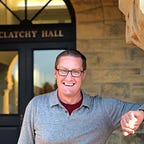Potential FCC move could decrease number of local journalists across America
TVNewsCheck today reports the latest in a series of moves that is reshaping local television — and along with it local journalism.
In many medium and small towns across America, legacy television stations and legacy newspaper operations form the backbone of enterprising journalism in those communities. While the majority of metropolitan areas are served by just one daily newspaper, many markets have several television stations, each producing independent reporting.
Wells Fargo analyst Marci Ryvicker said he expects the Federal Communications Commission to rollback two key rules when it meets in November — both which will likely have a material impact on local journalism.
- Allowing station group owners to own more than one station in a market area if there are less than eight “voices.” Currently, one company cannot own two stations if there would be less than eight independent companies broadcasting in a market. This precludes so-called duopolies in all but the largest markets. (In recent years, a number of workarounds have been used — which is why in some areas you may already see your local Fox and CBS stations joined up).
- Allowing one owner to scoop up two of the “top four” stations and operate them jointly. For instance, one owner could own the NBC and CBS stations. (Again, see caveat about workarounds above).
In plain English, fewer corporate owners would be allowed to buy more stations in individual towns across America.
The Wells Fargo report touts that such moves would be healthy for the bottom line. “(D)uopolies… exhibit much higher margins; hence we anticipate a stronger industry overall.”
Those higher margins come from lower operating costs. If one owner controls two stations, they can eliminate lots of duplicative costs — studios, cameras, administrative staff — and journalists.
While good business sense, the rulemaking at the FCC could further erode the number of local journalists serving their communities.
If the FCC changes its rules, and if media companies begin buying and swapping stations to save costs — it will often be touted as a way to improve coverage of a community.
This summer, Gray Television decided to combine newsgathering operations at two stations it owns in Springfield, MO — ABC affiliate KSPR-TV and NBC station KYTV-TV. Gray purchased Shruz Communications in 2016 — and for more than a year maintained separate, competing news opeartions.
“We will double the number of people on our staff who are actively pursuing local news stories on a daily basis,” KSPR-KYTV General Manager Brian McDonough said in a news release.
While it isn’t clear what metric McDonough was using, the combined news operations led to 37 layoffs — including a news director, lead anchor, reporter and two online producers.
“It had been increasingly difficult to properly divide resources between our two separate newsrooms,” McDonough said. “Our world is changing, and the demand for immediate original local content continues to grow across all our news platforms. We needed to adjust our staffing to reflect the changes around us.”
Leaders at many local media companies point to an increase in the number of hours produced — which has been on a steady increase in recent years according to Pew. However, with stretched resources — the number of hours doesn’t always correlate to the amount of actual journalism created. Resources are shared across newscasts — with similar sets, graphics, anchors and stories.
The combination of KSPR and KYTV and others like it help drive the bottom line and keep broadcasting sustainable financially — but when combined with dramatically declining employment at newspapers, local markets have fewer journalists to dig into public records, go to city council meetings, ask tough questions and hold the powerful to account.
Don Day is a 2018 Stanford John S. Knight Fellow. He has twenty years experience in media — leading teams, producing award-winning journalism and innovating in the digital journalism space. He currently is the publisher of BoiseDev.com.
